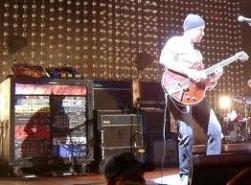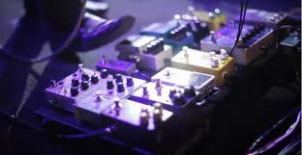Last winter, about this time, I was looking for new music. The quest for music for me is always challenging because this desire longs to be filled by sound that is new, fresh, unique, and not trendy but still stylishly correct. Good aesthetic and authenticity always go hand in hand (or at least they should), which means popular artists rarely hold much weight with me. Lyrics should come from the soul of a person’s being not from a producer who needs an artist to crank out a chart topper for greater job security. This rant is just to give an insight into how important quality music is to me.
 These limitations, or guidelines (whichever way you look at it) usually has a way of excluding anything with a sense of technology or effect-heavy music with the large exception of U2 and the handiwork of The Edge . It also rules out most electronic driven music, at least it used to. In my searching for something fresh I found a band called MUTEMATH. The name had been filed away a few years previously when one of my worship-pastor-friends had mentioned them but were quickly shadowed by my curiosity in Death Cab for Cutie at that point in time. MUTEMATH resurfaced and thanks to the genius (and highly controversial) Spotify I was able to get into MUTEMATH and quickly fell in love with there sound.
These limitations, or guidelines (whichever way you look at it) usually has a way of excluding anything with a sense of technology or effect-heavy music with the large exception of U2 and the handiwork of The Edge . It also rules out most electronic driven music, at least it used to. In my searching for something fresh I found a band called MUTEMATH. The name had been filed away a few years previously when one of my worship-pastor-friends had mentioned them but were quickly shadowed by my curiosity in Death Cab for Cutie at that point in time. MUTEMATH resurfaced and thanks to the genius (and highly controversial) Spotify I was able to get into MUTEMATH and quickly fell in love with there sound.
I did a little deeper digging and found out the lead singer, Paul Meany, grew up in New Orleans, and MUTEMATH started out as a Christian worship band known as “Earthsuit” and any material written under the name “Earthsuit” is extremely hard to come by. This past summer while on tour with a praise band I came across a sound-guy who had scoured the Internet looking and found their first album which was a live release of some original and other covered worship standards. The sound still remained though. Listening to both groups back to back was like seeing a soul transplant take place between two different bands. My new friend and I spent an hour talking that night just about the band and their roots. Earthsuit grew old quickly for the lead singer/front man and after being pursued by a couple of CCM recording labels the group decided to not go down the CCM route in fear of being too small and limited. They continued on as MUTEMATH and were signed by Warner Bros. in 2004 after releasing an EP and came out with their first album, self-titled, in 2006.
Talking about MUTEMATH and listening to them on iTunes is one thing, experiencing MUTEMATH in concert is a completely different story. Just listening to the difference between their studio albums and live concerts, there is a noticeable change in energy; you can tell the group loves sharing their music because their musicality increases as they have a heightened sense of awareness to their own interactions and those with the audience. Being in the audience is nothing less than mesmerizing. A wall of sound envelops the audience as soaring riffs transfer from bass to guitar with some incredibly unique organ pads under the riffs and then there is Darren King driving the whole sound behind the drums.
 (Yes, he is cool enough to use gaffing tape to anchor his headphone monitors to his ears for performances.)
(Yes, he is cool enough to use gaffing tape to anchor his headphone monitors to his ears for performances.)
Yes, I get it, I’m gushing. You’ll understand when you listen, or maybe I am overly impressed. The thing about this band is they have heavy electronic components woven into their sound, but it never gets in the way. Not ever. A lot of bands I’ve witnessed fall into this trap where electronics become the driving force behind the sound and music is shoved in the back seat or falls out of the bus entirely. Electronic music requires a certain responsibility to keep aware of the notes taking precedence over the effects that go behind the notes.
The music of MM contains a heavy New Orleans influence between certain blues riffs, and jazz influenced beats, but their music is intricately layered, textured, and woven together, with much attention paid to the details in a similar way to Radioheads’ sound. What is even more incredible in the live music sense is how the band has complete control over everything that is happening electronically and is best experienced in their song “Reset” which is typically the encore to every show they perform.
Todd Gummerman is the lead guitarist for the band who joined and helped write the 2011 release “Odd Soul,” has an incredibly complex set up to produce the sound he has. Todd even has it down so he can reproduce the sounds of the band’s previous guitarist, Greg Hill, and learned all of Greg’s guitar parts within weeks of going on tour with MUTEMATH to promote “Odd Soul”. Granted, if you do a quick search of Todd’s name you’ll quickly discover words such as “guitar-genius” and “prodigy” being thrown around. I found his blog and he wrote an excerpt about trying to find the balance of technology and music while on tour:
Other mishaps inevitably have happened, like: the rhodes collapsing shortly after Paul stood on it, Darren stabbing himself in the eye with a broken drumstick (yes, accidentally), knobs of pedals breaking right off in my fingers, calling B3 repairmen every four days, and the temporary failure of just about every piece of gear at least once, and of each facet of the drums- at least three times. Actually I was recently thinking to myself that it often feels like we’re professional troubleshooters first, and musicians second. That being said, we’d be seriously screwed without our invaluable crew, who I’ve mentioned before. Because even if we can diagnose the issue, they are usually the ones with the know-how and tools to actually fix said problem. They are forever watching over us: (proof)…
Roy Mitchell-Cárdenas is the bassist for the band is primarily writing the majority of the guitar parts on Odd Soul, and the video talks a lot about his role in the band, and also his control and knowledge of his electronic set up. You can check out JHS pedals too, most worthy of attention if you are serious about electric guitar tone.
While originally I was not attracted to bands who use a lot of synth-driven, guitars laden with effects, and drums with triggers all over them, MUTEMATH has stolen my heart as far as this kind of music is concerned. While not the trendy synth-driven, drum-loop back, pocket driven music of Owl City or the newly formed Hawk in Paris, MUTEMATH has helped define a generation of alternative rock. If other bands follow in the same path while creating their own identity, I believe the music industry has a hope of not looking like some of the artists it is backing right now.





Jack, I had heard about Mutemath while touring on a praise band over the summer, but I was never interested until reading your post about them. They seem like a very talented band, and I hope to start listening to them soon.
I’m glad you found a band that you like. Mutemath seems very interesting. I have never heard of them. Seeing how much this band made you happy makes me want to learn more about them. Good post
Currently listening to the top tracks on Spotify (which would be Blood Pressure and Typical) as I write this. Although it isn’t typically my style, I am enjoying it! Catchy stuff. I see what you mean: there are electronic elements but they complement the music instead of overwhelming it.